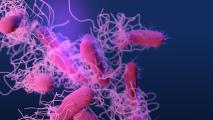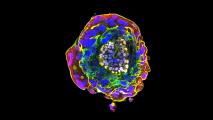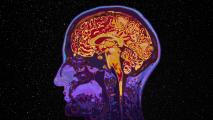By studying stool and saliva samples from thousands of people, researchers have discovered that the human microbiome is heavily influenced by our social interactions — a discovery that could help us treat or prevent microbiome-linked diseases.
The human microbiome: Your microbiome is a collection of trillions of microbes that live in and on your body. These organisms often play beneficial roles in your health, helping you digest food, ward off infections, and more.
The human microbiome changes over time, and while we know several factors that influence which microbes thrive and which don’t — diet, medication, lifestyle, etc. — we don’t really know much about how we acquire certain microbes in the first place.
If we can figure this out, it might help us understand the apparent link between disruptions in the microbiome and many health problems, including type 2 diabetes, depression, and certain types of cancer, and maybe even lead to new treatments or preventatives.
“The results suggest that social interactions actually shape the composition of our microbiomes.”
Mireia Valles-Colomer
What’s new? Led by Nicola Segata at the University of Trento, a team of researchers from 18 institutions has now published the largest study of how microbiome bacteria are transmitted — and they say we’re regularly swapping strains with the people around us.
“We have found evidence of extensive sharing of the gut and oral microbiome linked to the type of relationship and lifestyle,” said first author Mireia Valles-Colomer. “The results suggest that social interactions actually shape the composition of our microbiomes.”
Swapping strains: The researchers analyzed more than 9,000 stool and saliva samples from participants in 20 nations for their study and found more than 10 million instances of microbiome strain sharing between people.
The influence of mothers on the human microbiome is robust — mother-derived bacteria could still be detected in elderly study participants. But as we age, we regularly acquire new species and strains of bacteria from the people around us.
“In adulthood, the sources of our microbiomes are mostly the people we are in close contact with,” said Segata. “The duration of interactions — think, for example, of students or partners sharing an apartment — is roughly proportional to the number of bacteria exchanged.”
“Some of these are microbes from which we know very little; they have not even been named yet.”
Mireia Valles-Colomer
The researchers discovered that the collection of bacteria in our mouths is more influenced by the people we encounter than our mothers and that our oral microbiomes swap microbes more readily than our gut microbiomes.
They even identified specific microbiome bacteria that move from person to person more readily than most.
“Some of these are microbes from which we know very little; they have not even been named yet,” said Valles-Colomer. “This inspires us to study them better, as we still have many unanswered questions about the transmission mechanisms of the microbiome and how this affects our health.”
Looking ahead: In addition to studying those super-transmitters more closely, the researchers believe another area ripe for further study is the potential impact of transmission on microbiome-linked diseases, even ones we currently think of as non-communicable.
“The demonstration that the human microbiome is transmissible could suggest that some of these diseases … could, at least to a certain extent, be communicable,” said Segata.
“Further studies on the transmission of the microbiome can therefore advance the understanding of the risk factors of these diseases and, in the future, explore the possibility of reducing the risk with therapies that act on the microbiome or its transmissible components,” he continued.
We’d love to hear from you! If you have a comment about this article or if you have a tip for a future Freethink story, please email us at tips@freethink.com.






